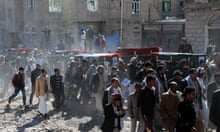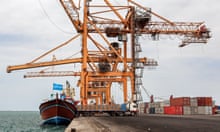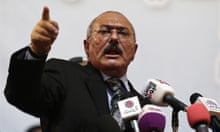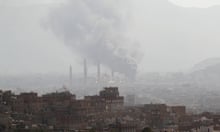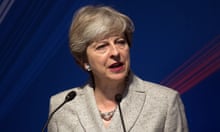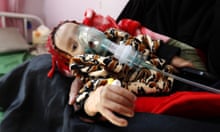Houthi rebels who seized full control of the Yemeni capital Sana’a over the past week have detained more than 40 media staff, press watchdogs have said, demanding their immediate release.
Among those captured are staff working for Yemen Today – a television channel affiliated with the former president Ali Abdullah Saleh, who was killed by the rebels on Monday as he fled the capital following the collapse of an uneasy three-year alliance.
The rebels overran the TV station’s Sana’a offices on Saturday after attacking it with rocket-propelled grenades and wounding three guards, Reporters Without Borders said. “This hostage-taking is typical of the climate of hostility in Yemen towards journalists,” said RSF’s Alexandra El Khazen.
A spokesman for the Committee to Protect Journalists called for the immediate release of the journalists, saying the Houthi attack on Yemen Today “shows a profound contempt for press freedom”.
Early on Wednesday, the Saudi-led coalition intensified its airstrikes over Yemen, one day after the Houthis moved against a group of Saleh’s diehard loyalists in the city.
Coalition fighter jets carried out dozens of airstrikes, both sides said, bombing Houthi positions inside Sana’a and in other northern provinces. Residents said loud explosions were heard in central Sana’a.
Tuesday’s clashes near what had been Saleh’s house came as residents seized upon the relative calmness elsewhere in Sana’a to go out after five days of street fighting to hoard food.
Sources on the ground told the Guardian that Houthi fighters had coalesced around a small area in Hada Street to remove the last stronghold of remaining Saleh loyalists who had refused to surrender. A video posted by Ansar Allah media centre, a Houthi mouthpiece, showed dozens of detained Saleh loyalist fighters.
Businesses opened as usual on Tuesday and people rushed to stockpile food, fearing a return of the chaotic fighting seen over the weekend as the fragile alliance of Houthi rebels and Saleh forces was shattered. The clashes left at least 230 people dead and thousands more injured.
Aid workers in Sana’a were in lockdown. Rajat Madhok, a Unicef official said: “Ambulances and medical teams can’t access the injured, people trapped in the fighting cannot buy food and other essential supplies. Aid workers can’t travel and implement critical life-saving programmes.”
Resentment towards the Houthis appears to be building, as people who have not been paid salaries for more than a year have become frustrated by the stalemated conflict and Saudi bombing raids.
Saleh, a former leader who ruled Yemen for more than 33 years, was killed on Monday by the Iran-backed Houthis after he signalled he was ending his uneasy alliance with the rebels and swapping sides, opening channels to Saudi Arabia.
Saleh’s reluctant departure from power in 2012 – forced on him by the Arab spring – brought his Saudi-backed deputy, Abdu Rabbu Mansour Hadi, into office. In 2014, Saleh forged an unlikely alliance with the Houthis, his longtime enemies, helping them to take over Sana’a.
The offensive forced Hadi to flee to Saudi Arabia and sparked a conflict that has plunged the Arab world’s poorest nation into a humanitarian crisis, leaving it on the brink of famine and facing an unprecedented cholera crisis.
TimelineYemen since the Arab spring
Show
Arab spring protests erupt against Ali Abdullah Saleh, in power in Yemen since 1978. He agrees to step down in return for immunity from prosecution
Abd-Rabbu Mansour Hadi, Saleh’s former deputy, succeeds him as president.
Anti-Hadi protests hit the capital, Sana’a, after a cut to government fuel subsidies sharply increases fuel prices.
Houthi rebels take control of most of Sana’a and form an anti-Hadi alliance with forces loyal to Saleh.
The Saleh-Houthi forces seize the presidential palace in Sana’a and Hadi flees to Aden, Yemen’s second city.
Saudi Arabia enters the war at the head of a nine-country coalition bombing the rebels in defence of Hadi’s internationally-recognised government.
The UN puts the death toll at 10,000 since the Saudi intervention.
Saudi Arabia tightens its blockade on Yemen, including of humanitarian aid, after a rocket fired from the country falls close to Riyadh.
Saleh reaches out to the Saudi-led coalition, offering to “turn the page” if it lifts the blockade. The Houthis accuse him of a “coup against our alliance” and ambush his convoy as it flees Sana’a, killing him.
A major Saudi-led coalition assault on the port city of Al Hudaydah begins, codenamed Operation Golden Victory.
Houthi drones attack two oil pumping stations inside Saudi Arabia, damaging pipelines.
The UAE withdraws most of its forces from the Saudi-led coalition.
“Saleh was our president since we were born, we don’t know how our life will be without him,” said Mustafa, a resident of Sana’a. “People are sad, even those who I know that used to hate him. Houthi are hated by all people, they are there with the power of weapons and money. Saleh had the power of people around him.”
Although Saleh was accused of corruption and nepotism, he was relatively popular in northern Yemen, which is in the control of the Houthis. Southern Yemenis, particularly separatists, despised him and many celebrated his death by setting off fireworks.
Mustafa said things were “totally quiet” in Sana’a, bar the occasional sound of jets. “Roads were closed in the last three days, but now they’re reopened … Prices are high, the petrol is $1 per litre.”
At least 25 airstrikes were reported overnight but the UN said its aid flights had managed to land at the capital’s airport.
Saleh’s exiled son, Ahmed Ali Saleh, was quoted by a Saudi news network as saying he was seeking revenge. “I will lead the battle until the last Houthi is thrown out of Yemen … the blood of my father will be hell ringing in the ears of Iran,” he said.
Ahmad Algohbary, a Yemeni journalist based in Sana’a, said the Houthis had a strong hand in the capital because Saleh’s forces had either surrendered or were too afraid to resist.
“It was life as usual today, but three days ago it was like hell. Nobody could get out, I couldn’t go out to get water, it was gunfire everywhere, mortar shell was close to our home, my mum was crying,” he said.
“I got out today, I saw people outside, they’re buying. They used to buy half a kilo of things, like half a kilo of tomatoes, and now they’re buying three to four kilos because they’re afraid of the next days.”
Osamah al Faqih, a human rights researcher based in Sana’a, had to leave his house with his wife and shelter at a relative’s home when the violence erupted on Thursday.
He said: “Since Saleh’s death there’s no clashes but people are still afraid and don’t know what will come next,” he said. “People are buying food items just to prepare for any worst situation. We don’t know what will come next … I’m really concerned about the lives of civilians and the scale of human rights violations against the civilians, violation of humanitarian laws by both sides.”

